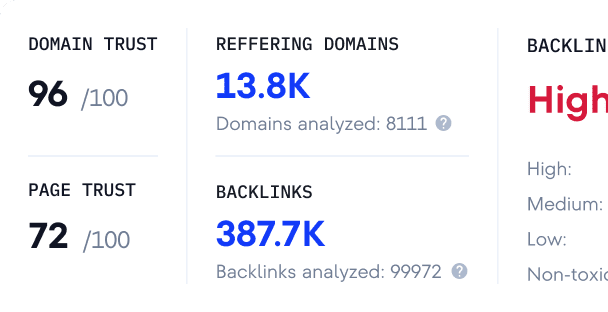Understanding Referring Domains and Their Impact on SEO
As a website owner or agency, you’re probably seeking ways to improve your site’s rankings and attract more visitors. While some may argue that the importance of backlinks has diminished in recent years, high-quality backlinks still play a significant role in improving your website’s search engine rankings and driving traffic to it.
This article discusses the importance of referring domains for SEO and provides insight on how to check referring domains using various metrics. Whether you’re new to SEO or you’re a seasoned pro, tapping into the potential of referring domains is key to improving your website’s search engine rankings.
So, let’s hop right in!
Key takeaways
- Referring domains are distinct from backlinks; a single referring domain can have multiple backlinks. Referring websites signal to search engines about the authority and relevancy of your website, which directly influences its search engine rankings and organic traffic.
- To determine whether a referring domain is high-quality, use the following parameters to assess it:
- Its referring domain and backlink count
- Its acquisition rate for new referring sources and backlinks
- The distribution of links pointing to the referring domain’s homepage and other pages
- The anchor text distribution of both referring domains and backlinks
- The geographical distribution map
- The presence of toxic and broken backlinks within it
- Use the following link building strategies to get higher quality referring sites:
- Guest posting
- Broken link building
- Digital PR
- Competitor analysis
What is a referring domain?
A referring domain is an external website that links to your website. This can include a variety of sources, such as corporate blogs, news sites, educational and governmental websites, social media platforms, forums, online directories, and other websites in your industry or niche. It’s important to keep in mind that not all referring domains are created equal. Links coming from authoritative and relevant websites hold more value than links from low-quality websites.
A referring domain is an important SEO metric because it signals to search engines that your content is valuable and relevant. The greater the number of high-quality referring sites linking to your site, the more likely it is that search engines will view your site as authoritative and relevant in your niche or industry. For this reason, you’ll want to focus on building a diverse, high-quality backlink profile. This will help to improve your website’s search engine rankings and attract more traffic to your site.
Referring domains vs backlinks: What is the difference between a referring domain and a backlink?
The terms “referring domain” and “backlink” are often used interchangeably, but they actually refer to different things. A backlink is simply a link from one website to another, but a single referring domain may contain several links that lead to your website.
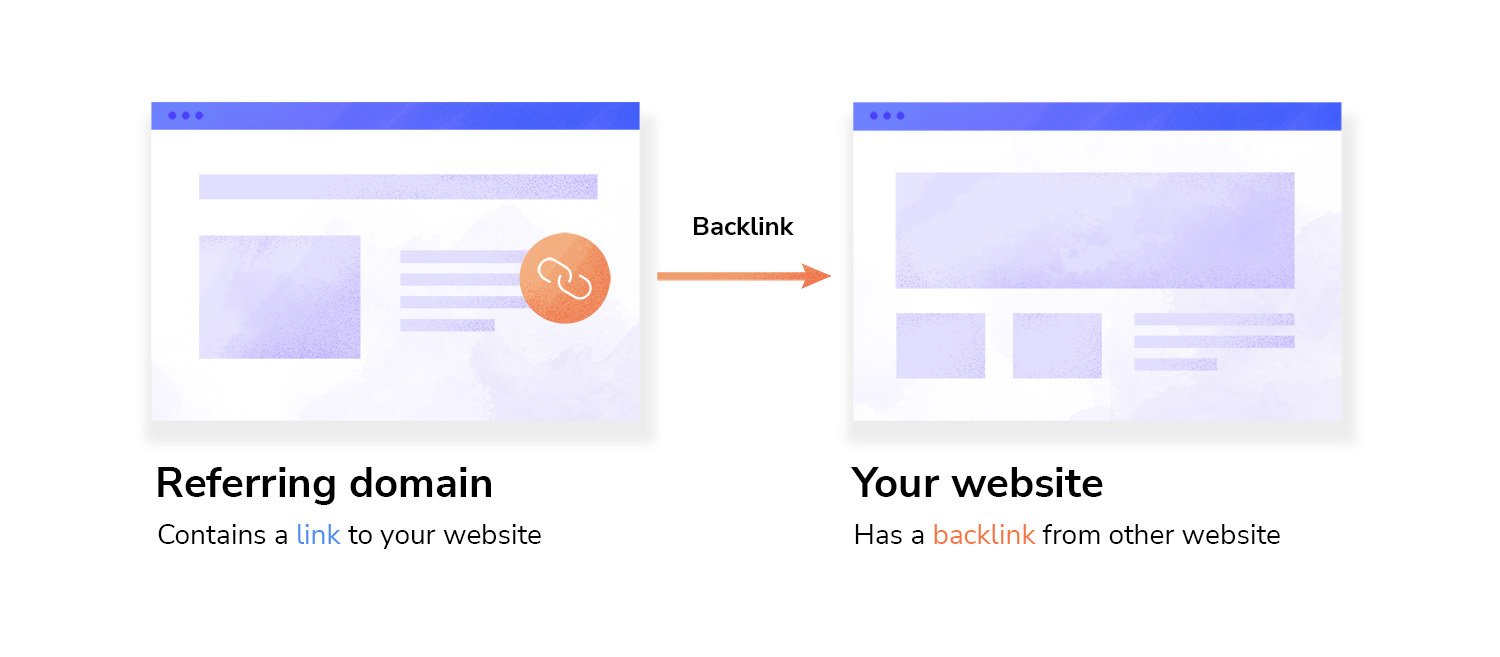
Backlinks and referring domains are both important SEO metrics to track. By carefully analyzing each, you can better understand your website’s authority, relevance, and SERP visibility.
Why referring domains are important
Referring domains are important for SEO because they are a major ranking factor for search engines. Whenever your website receives backlinks from authoritative domains, Google considers the content that’s being linked to to be trustworthy. This leads to your site having higher search engine rankings and more organic traffic.
Referring sites are especially important because they reflect the overall diversity and quality of your backlink profile. If your website has lots of referring domains, this indicates to Google that your site has received backlinks from a wide range of sources, which strengthens its authority. Having a diverse range of referring domains also suggests that your website’s content is relevant and useful to a broad audience.
With Google, it works the same way.
Whenever your website gets an endorsement (in the form of a backlink) from a new domain, Google appreciates it. When the same domain endorses you again, Google still appreciates it, but the value of that second show of support pales in comparison to that of a new domain “recommending” your website. So, while getting the tenth link from the same website won’t get you into hot water, it won’t benefit your website as much either.
If your website has a low number of referring domains, it will be seen as less trustworthy and will struggle to rank well in search results. Similarly, if your site receives backlinks from low-quality or spammy domains, this can harm its reputation and can even result in a penalty from search engines.
This is one major reason why you need to pay attention to the referring domain metric, which shows the true value of your backlink profile. Many SEO professionals analyze their referring domains to identify areas for improvement in their backlink profiles. You can use what you learned from your current backlink profile to take the necessary steps in increasing the number of high-quality referring domains to your site.
Now, let’s look into some ways to analyze referring domains for better SEO results.
How to check referring domains
Many third-party tools, including SE Ranking, help SEO agencies analyze their backlinks and referring domain metrics. Our tool for backlink lookup, can retrieve SEO data for an entire site and its subdomains, displaying everything on a single dashboard. This allows you to analyze referring domains and backlinks side by side. In April 2024, we improved SE Ranking’s backlink database by removing old data and increasing update speed. This makes backlink profile analysis faster and more accurate.
SE Ranking’s Backlink Checker assists you in finding:
- The number of referring domains and backlinks
- The pace at which the website acquires new backlinks and referring domains
- The portion of links pointing to the homepage compared to other pages
- The anchor text for both referring domains and backlinks
- The geographical distribution map
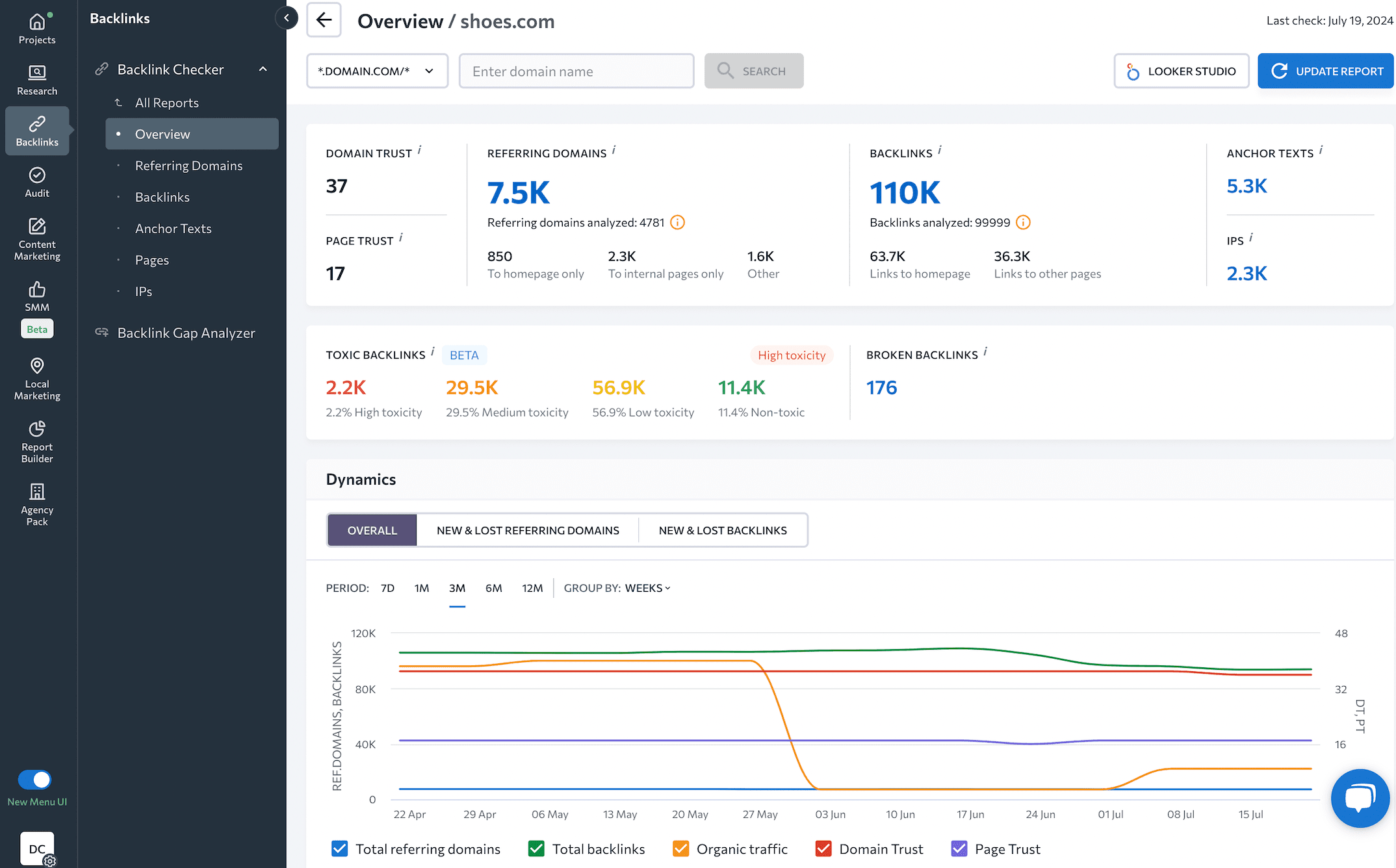
Let’s take a closer look at each metric in more detail to find out what it means:
- The number of referring domains and backlinks. By comparing the ratio between referring domains and backlinks, you can quickly determine how diverse your backlink profile is. The tool also provides complete lists of backlinks and referring sites, including key metrics for backlink profile analysis.
- The rate of acquisition of new referring domains and backlinks. By tracking the growth rate of your backlink profile over time, you can identify any spikes or drops in growth to make informed decisions about your outreach strategy.
- The distribution of links pointing to the home page and other pages on your website. A healthy backlink profile should have a mix of links pointing to the home page and other pages on your website. By analyzing this metric, you can ensure that your link structure is well-optimized.
- Anchor text distribution for both referring domains and backlinks. Anchor text is the clickable text that appears as a hyperlink. By analyzing the anchor text distribution for both referring domains and backlinks, you can ensure that your anchor texts are relevant and diverse.
- The geographical distribution map. This metric shows where the majority of your backlinks are coming from. By analyzing this data, you can tailor your outreach efforts to specific regions and identify potential opportunities for growth.
- Link toxicity and the percentage of broken backlinks. This shows how many unnatural, suspicious, or low-quality links, and backlinks leading non-existent pages, are in the backlink profile. You can also view a full list of these backlinks to address them.
We highly suggest that you analyze all of these metrics. This will give you a better understanding of your backlink profile and help you make informed decisions that lead to improved SEO results, including higher search engine rankings and increased organic traffic.
How to get referring domains
Now that you know why referring domains are crucial for SEO, let’s look into some ways to get them. Here are some of the most popular and effective ways to acquire new linking websites (and different backlink types):
- Guest posting: Writing high-quality articles for other websites in exchange for a backlink to your site.
- Broken link building: Finding broken links on other websites and offering to replace them with a link to your content.
- Competitor analysis: Analyzing your competitors’ backlink profiles to see which referring domains they have and identifying opportunities to get links from those sites.
- Digital PR: Getting backlinks from content that promotes your brand, or creating useful and viral content (e.g., SE Ranking’s AIO research) that naturally attracts backlinks.
For more insights, check out the complete backlink building guide for beginners.
Creating high-quality, authoritative content is arguably the most effective way to increase the number of referring domains to your site. This can include blog posts, infographics, videos, and other types of content that provide value to your target audience. By doing so, you increase the chances of other websites linking back to your content, which in turn increases the number of referring domains to your site.
SE Ranking’s Content Marketing Tool can help you create content that’s not only SEO-friendly but also appeals to your target audience and attracts new backlinks. Our platform enables users to generate new topic ideas, conduct keyword research, track content performance, and create content briefs. It also has a built-in editor that empowers users to optimize and analyze content in real time. Additionally, this platform offers content planning and collaboration features that help teams work together more efficiently. With this tool, website owners and SEO agencies can produce superior content that not only engages their audience but also garners more backlinks and achieves high rankings in search engines.
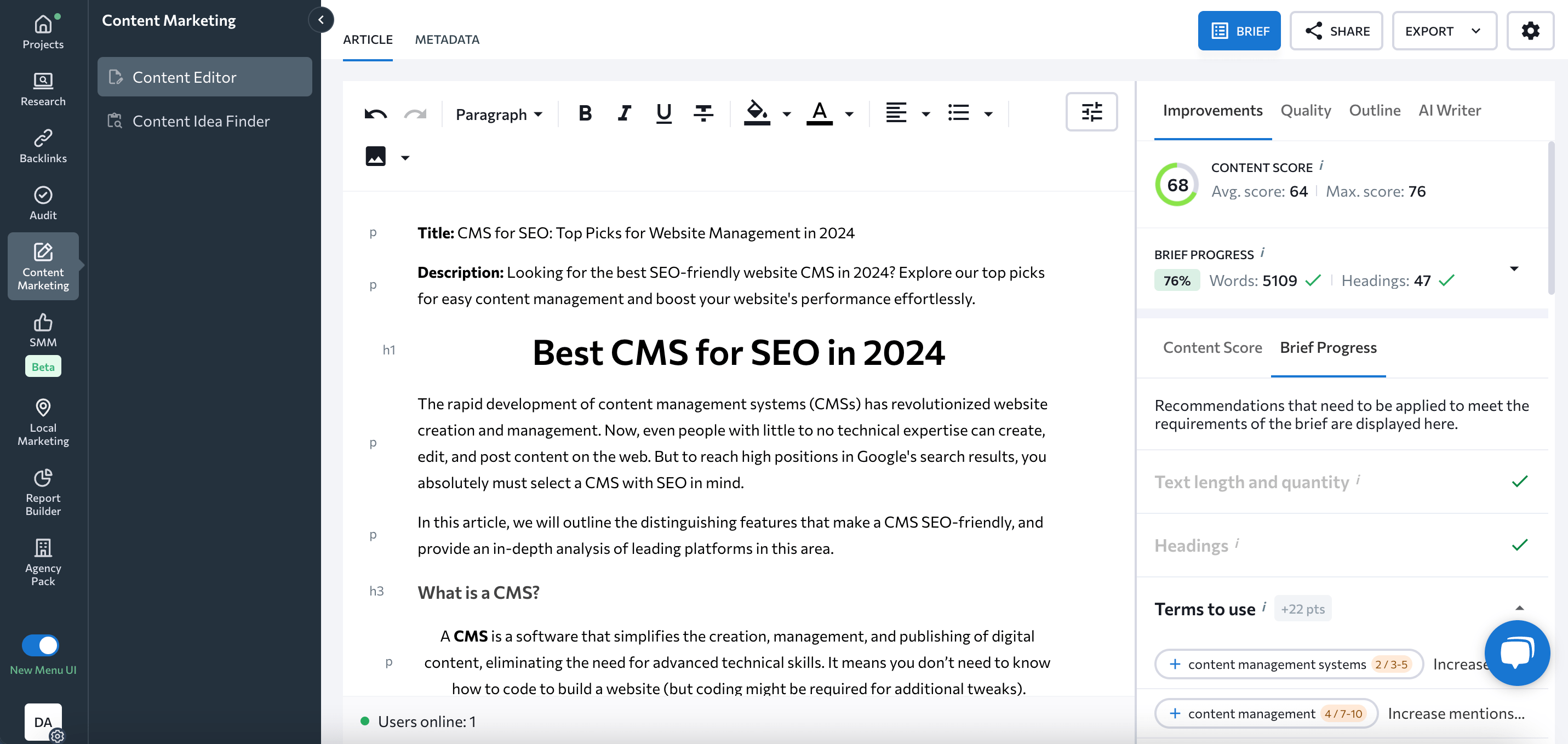
Another way to get more referring sources is to analyze your competitors and find new niches. You can identify websites that link to your competitors, contact them, and offer your own content for them to use as a valuable resource. This can lead to your site getting new backlinks and referring sites.
SE Ranking’s Competitor Research tool is a comprehensive solution that lets you analyze your competitors’ backlink profiles and identify referring sites linking to them. You can also identify new niches and opportunity areas overlooked by your competitors. This gives you a competitive edge in attracting new backlinks and referring domains. The Competitor Research tool’s vast data and insights help users stay ahead of the competition and improve their backlink profile. In 2024, SE Ranking updated its Competitor Research tool, expanding its keyword database for major markets and developing a new formula with an AI-powered algorithm for organic traffic. These enhancements deliver more accurate data than ever before.
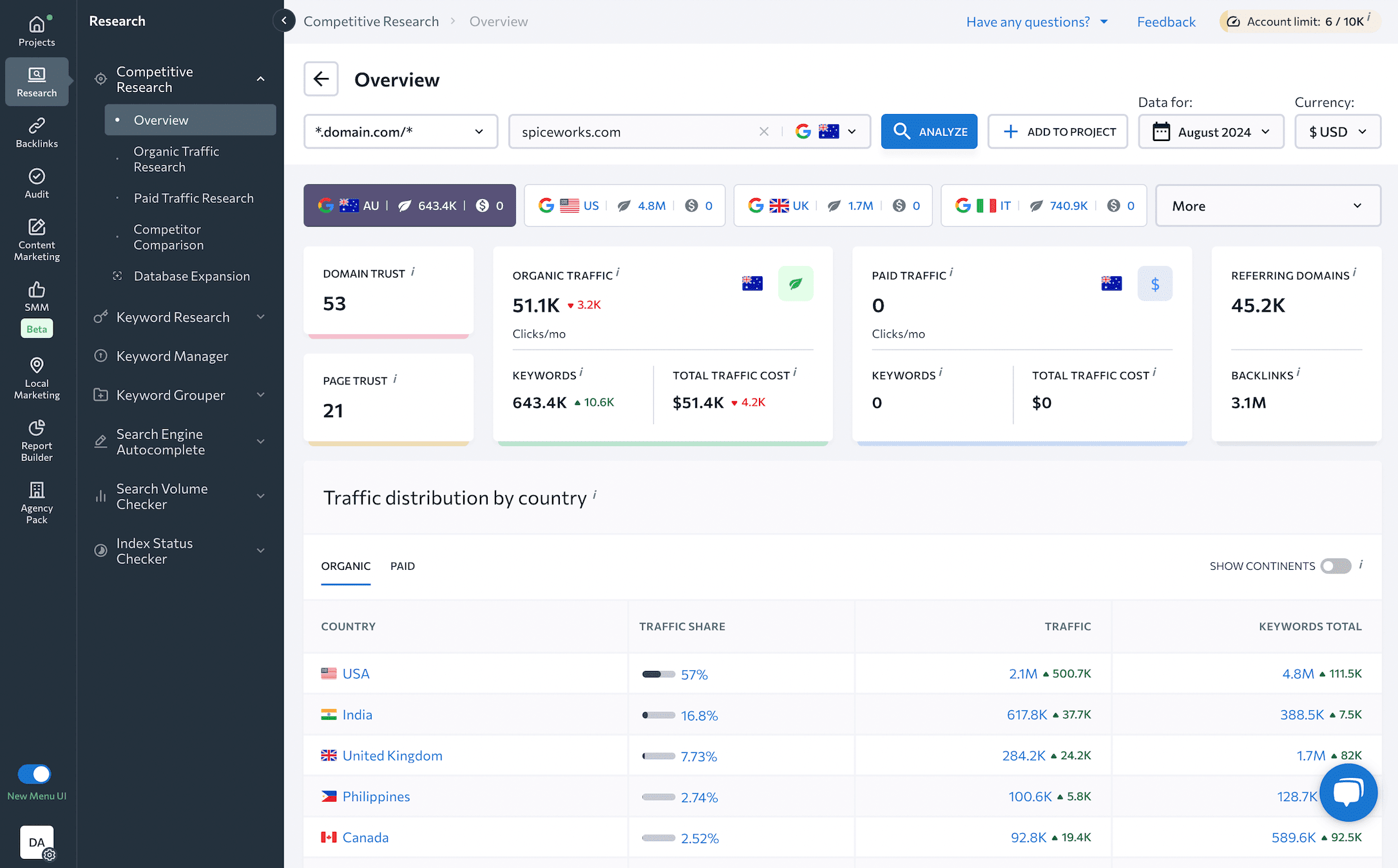
Summary
Referring domains play a crucial role in ensuring your website’s SEO success. To guarantee your site receives quality backlinks, analyzing your backlink profile and monitoring your referring domains is a must. Here are some final website performance enhancement tips:
- Focus on creating high-quality content that provides value to your audience. This will increase the chances of other websites linking back to your site.
- Analyze your competitors’ backlink profiles to identify potential referring websites to target. Studying their backlink profiles helps you identify sites that link to multiple competitors and pinpoint the most valuable sites to target.
- Build relationships with other website owners and bloggers in your industry to encourage them to link to your site through guest posting, collaboration, and other forms of outreach.
- Monitor your backlink profile regularly to ensure that low-quality referring domains do not link to your site. Disavowing bad backlinks can help improve your website’s search engine rankings and protect it from penalties.
Follow these tips to improve the quality and quantity of your linking websites and get better SEO performance for your website. Remember, increasing your referring domains requires ongoing effort, but the rewards are worth it!
